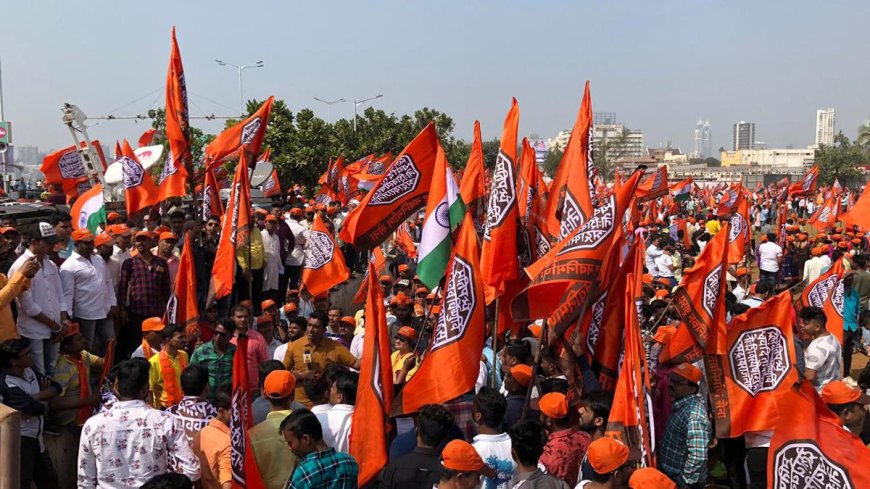Mira-Bhayandar Uproar: MNS Rally Triggers Police Transfer and Political Backlash Over Marathi Identity Row
A high-stakes MNS rally in Mira-Bhayandar for Marathi language rights led to the sudden transfer of the police chief, drawing criticism from MNS and Shiv Sena (UBT) leaders. The incident has intensified Maharashtra’s language politics debate.

Mira-Bhayandar Erupts in Tension After MNS Protest: Police Chief Shuffled Amid Political Firestorm
In a development that has reignited linguistic and regional tensions across Maharashtra, a large-scale protest by the Maharashtra Navnirman Sena (MNS) in Mira-Bhayandar has resulted in the abrupt transfer of the local police commissioner, raising sharp questions about political overreach and the protection of Marathi identity in urban spaces.
While state officials described the move as a routine administrative shuffle, critics — including prominent leaders from both the MNS and Shiv Sena (UBT) — allege that the transfer was a direct consequence of how the police handled the protest, which involved early morning detentions of MNS workers and restrictions placed on demonstrators.
The Rally That Sparked a Storm
The MNS-led demonstration, held earlier this week, was organized to demand stricter enforcement of Marathi as the default language in signage, commercial establishments, and local governance. MNS workers flooded the streets of Mira-Bhayandar, chanting slogans and distributing pamphlets emphasizing the “Marathi Asmita” (Marathi pride).
What was intended to be a peaceful protest soon escalated into political drama after several key activists were detained pre-emptively, sparking public outrage and media coverage. Videos circulated showing police officers attempting to control the crowd, while senior MNS functionaries accused the administration of violating democratic rights.
Police Commissioner’s Transfer Raises Eyebrows
Just 24 hours after the rally, Mira-Bhayandar’s police commissioner was transferred without explanation, triggering accusations of political interference. Sources within the local administration suggest that pressure from higher authorities contributed to the decision.
Raj Thackeray’s MNS condemned the move, calling it “an attempt to intimidate the voice of Marathi people.” Shiv Sena (UBT) leaders joined the chorus, accusing the Eknath Shinde-led government of bowing to pressure from allies who prefer a more cosmopolitan identity for Mumbai’s satellite regions.
Shiv Sena (UBT) & MNS: A Rare Unity?
Interestingly, the incident has brought Raj Thackeray and Uddhav Thackeray closer in their rhetoric. Both parties, historically adversaries, found common ground in criticizing the state government’s “indifference” to regional sentiments.
A joint statement released by local units of both parties read, “Transferring an officer for facilitating a democratic protest reflects the government’s deep discomfort with Marathi identity politics. This will not be tolerated.”
While no formal alliance has been announced, political analysts are watching the developments closely. Any coalition — even informal — between the MNS and Shiv Sena (UBT) could alter the balance of power ahead of upcoming municipal and assembly elections.
The Larger Context: Language Politics in Maharashtra
The Mira-Bhayandar episode is not isolated. Over the last few months, there has been a noticeable uptick in linguistic assertiveness campaigns across Maharashtra. With growing criticism of the imposition of Hindi and English in urban spaces, groups like the MNS are reviving their core narrative around Marathi identity.
Recent protests in Mumbai, Thane, and Nashik have all revolved around demands for stronger local language usage in banks, schools, restaurants, and public services. MNS believes the rising number of migrants in Maharashtra is leading to “cultural dilution.”
However, detractors argue that such movements border on intimidation and regional chauvinism, especially when accompanied by viral videos showing MNS workers confronting business owners and staff.
Administrative Reactions and Civil Society Response
Maharashtra’s Home Department has so far declined to comment on the specific reasons for the police transfer. However, insiders suggest that the state is walking a tightrope — trying to maintain law and order while not alienating a section of the electorate that strongly identifies with the Marathi cause.
Meanwhile, civil society groups and legal experts have raised concerns over both administrative arbitrariness and vigilante-style activism. The balance between regional pride and civic pluralism, they argue, is being tested once again.
Conclusion: Symbolic or Strategic?
Whether the police transfer in Mira-Bhayandar was a symbolic sacrifice or a strategic repositioning remains unclear. But what’s evident is this: language politics in Maharashtra is re-emerging as a dominant electoral and cultural force.
With MNS capitalizing on Marathi sentiment, and Shiv Sena (UBT) ready to piggyback on the narrative, the issue is likely to remain in focus in the months leading to the civic and state elections.














